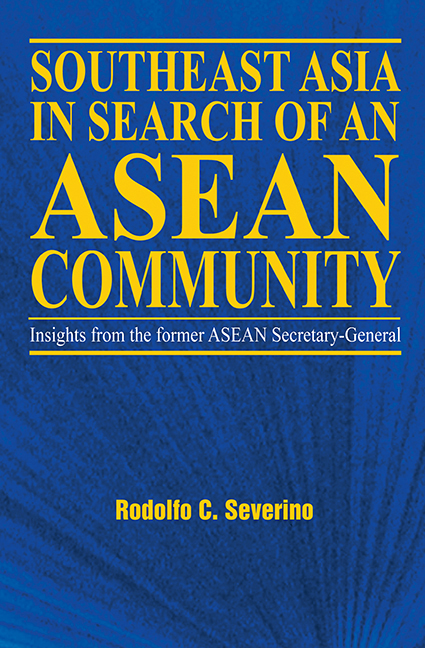Book contents
- Frontmatter
- Contents
- Foreword
- Introduction
- About the Author
- Acknowledgements
- Glossary
- 1 The “ASEAN Way”: Its Nature and Origins
- 2 Who Belongs in ASEAN? The Question of Membership
- 3 The Issue of Non-Interference
- 4 Regional Security: The ASEAN Role
- 5 Integrating the Regional Economy
- 6 ASEAN and the World
- 7 The ASEAN Community: Is It for Real?
- 8 What Kind of Future for ASEAN?
- Appendices
- A The ASEAN Declaration
- B Treaty of Amity and Cooperation in Southeast Asia
- C Agreement on the Common Effective Preferential Tariff Scheme for the ASEAN Free Trade Area
- D ASEAN Vision 2020
- E ASEAN at a Crossroads
- F Declaration of ASEAN Concord II
- G Recommendations of the High-Level Task Force on ASEAN Economic Integration
- H ASEAN Security Community Plan of Action
- I The ASEAN Socio-Cultural Community (ASCC) Plan of Action
- Interviews
- Index
I - The ASEAN Socio-Cultural Community (ASCC) Plan of Action
from Appendices
Published online by Cambridge University Press: 21 October 2015
- Frontmatter
- Contents
- Foreword
- Introduction
- About the Author
- Acknowledgements
- Glossary
- 1 The “ASEAN Way”: Its Nature and Origins
- 2 Who Belongs in ASEAN? The Question of Membership
- 3 The Issue of Non-Interference
- 4 Regional Security: The ASEAN Role
- 5 Integrating the Regional Economy
- 6 ASEAN and the World
- 7 The ASEAN Community: Is It for Real?
- 8 What Kind of Future for ASEAN?
- Appendices
- A The ASEAN Declaration
- B Treaty of Amity and Cooperation in Southeast Asia
- C Agreement on the Common Effective Preferential Tariff Scheme for the ASEAN Free Trade Area
- D ASEAN Vision 2020
- E ASEAN at a Crossroads
- F Declaration of ASEAN Concord II
- G Recommendations of the High-Level Task Force on ASEAN Economic Integration
- H ASEAN Security Community Plan of Action
- I The ASEAN Socio-Cultural Community (ASCC) Plan of Action
- Interviews
- Index
Summary
INTRODUCTION
1. The Vision of an ASEAN Socio-Cultural Community
Embedded in ASEAN Vision 2020, Declaration of ASEAN Concord I (1976), Declaration of ASEAN Concord II (2003) and the Hanoi Plan of Action (HPA) is ASEAN's goal of a community of cohesive, equitable and harmonious societies, bound together in solidarity for deeper understanding and cooperation. Its key features are:
• Equitable access to opportunities will be universal — rising above the barriers of religion, race, language, gender and social and cultural background;
• Human potentials are nurtured to the fullest, so that all individuals can participate meaningfully in a competitive world in a manner that gives paramount importance to their welfare and dignity;
• Norms of social and distributive justice are upheld by addressing issues of poverty and equity, and special care is given to vulnerable groups — children, youth, women, the elderly, and persons with disabilities — who could be the subject of abuse, neglect and discrimination;
• The environment and natural resources are protected and managed to sustain development and as a legacy for future generations;
• Civil society is engaged in providing inputs for policy choices;
• People are healthy in mind and body and living in harmony in safe environments; and
• ASEAN citizens interact in a community conscious of its ties of history, aware of its cultural heritage and bound by a common regional identity.
The Imperatives of the ASEAN Socio-Cultural Community
2. The ASCC reflects ASEAN's social agenda that is focused on poverty eradication and human development. It is linked inextricably with the economic and security pillars of the ASEAN Community. Social inequities can threaten economic development and in turn undermine political regimes. Economic instability can exacerbate poverty, unemployment, hunger, illness and disease. Social instability can emerge from environmental scarcity or the inequitable distribution among stakeholders of the use of environmental assets. Failure to address these critical and persistent social issues can further cause both economic and political dislocations.
- Type
- Chapter
- Information
- Southeast Asia in Search of an ASEAN Community , pp. 450 - 462Publisher: ISEAS–Yusof Ishak InstitutePrint publication year: 2006



